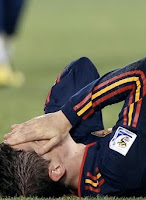 Keisuke Honda (Japan)
Keisuke Honda (Japan) Honda is one of very few players who could expect a move to a big club because of his performance at the World Cup. He, almost single-handedly, made Japan an attacking and creative threat during the tournament and rarely gave the ball away. His balance, first touch, technique and determination made him great to watch, and he even scored a long-range free kick with the seemingly untameable Jabulani. Better was still to come in that match against Denmark, with Honda tricking his way past the last defender, committing the goalkeeper and selflessly squaring the ball to a teammate who passed into an open goal for Japan’s third. It was a shame for him and the tournament that Japan couldn't beat the less entertaining Paraguay on penalties.

Bastian Schweinsteiger (Germany)
Schweinsteiger played in a slightly more defensive role for Germany than in previous tournaments and this allowed a more combative side of his game to shine. He was always quick to the tackle and put in a commanding performance to help the Germans thrash Argentina in the quarter-finals. Despite the tag of ‘midfield enforcer’, Schweinsteiger finished as the player with the most assists for the tournament, the best of which was his run for Germany’s third against Argentina where he beat three men to play in Friedrich. Thomas Muller may have won the golden boot but he did so by profiting from a system that had Schweinsteiger as its linchpin.

Wesley Sneijder (Holland)
Sneijder followed a great season at Inter Milan with a terrific tournament for the Dutch. He was Holland’s best attacking player and his creative passing was even more effective when Robben finally returned to the line-up. Capped a great team performance by scoring the winner against Brazil when Holland came from 1-0 down. He must feel a heightened sense of frustration after the final, knowing he could have won the golden boot if Holland hadn’t gone so negative against Spain.
 Diego Forlan (Uruguay)
Diego Forlan (Uruguay)The poor lad had a shocking time of it at Man Utd but he seemed to forget all about that a while ago and it’s perhaps time we tried to as well. Joint top scorer for the tournament, Forlan was integral to Uruguay’s unexpected success and was named the Golden Ball winner at the end of the competition. His confidence and technique made him the best striker of the ball from distance and it was cruel to see his last shot of the World Cup clip the German crossbar in the last minute of Uruguay’s 3-2 loss. Looked sharp and threatening whenever he played.
 Xavi Hernandez (Spain)
Xavi Hernandez (Spain)There is clearly a case to be made for including Villa or Iniesta instead of Xavi in this list but that would, for one thing, make this truly awful Daily Mail headline in 2009 less relevant - it’s particularly delightful given everyone else pictured with Xavi flopped at this World Cup. Moronic journalism aside, Xavi is the heartbeat of a Spanish side that conquered the world this summer by sticking to the slick passing and possession game that has brought them success for the last few years. Those at Opta reckon he touched the ball every 46 seconds in Spain’s World Cup matches and his close control, vision and accurate passing were crucial to Spain’s success.

Alexis Sanchez (Chile)
Sanchez was one of few exciting players in the early group stages, making some dazzling runs with his pace and quick, tricky dribbling. Like Honda for Japan, he was clearly his team’s standout player and rumours suggest the likes of Real Madrid and Man Utd are interested in signing him from Udinese. These rumours are quite probably rubbish but it illustrates the high regard in which he is now held. At 21 he is a very promising talent.
 Fabio Coentrao (Portugal)
Fabio Coentrao (Portugal)Even in an overly conservative Portugal team, Coentrao managed to shine with some rampaging runs down Portugal’s left side. His speed was matched by a work ethic that saw him up and down the left wing for most of Portugal’s matches. His defensive positioning and tackling was also impressive considering he is a predominantly attacking left back and used to be a winger. If Queiroz had been prepared to commit more Portugese players to the opposing team’s box, more of Coentrao’s crosses might have ended up in back of the net.


 Fernando Torres (Spain)
Fernando Torres (Spain) Steven Pienaar (South Africa)
Steven Pienaar (South Africa) Nicklas Bendtner (Denmark)
Nicklas Bendtner (Denmark) Vincenzo Iaquinta (Italy)
Vincenzo Iaquinta (Italy) Humberto Suazo (Chile)
Humberto Suazo (Chile)